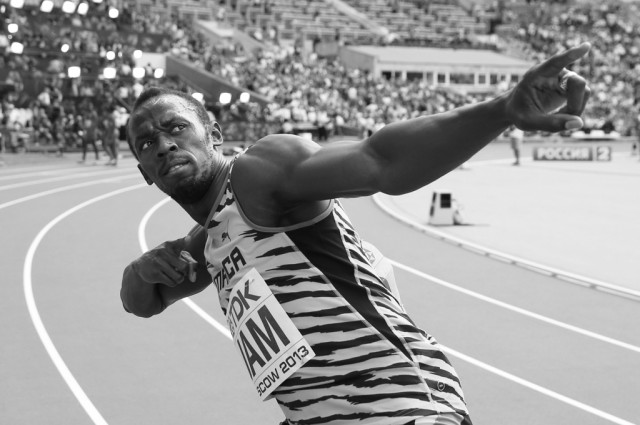Usain Bolt – the Lightning Bolt
At the age of 15, Bolt became the youngest world-junior gold medallist ever in the 2002 World Junior Championships.

Usain Bolt’s rise from rags to riches is part of the fairytale that saw him going from relative obscurity to unprecedented fame in a matter of little over five years. PHOTO: AFP/FILE
“Usain’s three gold medals brought us running water. Now we’re praying for another gold medal to fix up the road.”
The innocent – yet poignant – remark was made in 2009 by a villager belonging to the world’s fastest man’s childhood abode, after the 2008 Beijing Olympics saw the Jamaican winning three gold medals in the 100-metre and 200-metre sprints as well as the 4x100 metres relay.
Usain Bolt’s rise from rags to riches is part of the fairytale that saw him going from relative obscurity to unprecedented fame in a matter of little over five years. However, the seemingly enchanted journey was more of a testament to Bolt’s abilities and dedication rather than the result of sheer luck.
Born in the small town of Sherwood Content – an amalgamation of the villages Sherwood and Content – to the owners of a local grocery store in the rural area, the sprinter spent his childhood playing different sports with his brother on the streets.
It wasn’t long before Bolt’s high school cricket coach took note of the youngster’s speed on the pitch, and urged him to go for track and field events. Olympic sprinter Pablo McNeil took Bolt under his wing and is responsible for honing the talent of the budding athlete.
The ‘Lightning Bolt’ started his regional competitions in the 2001 Caribbean Free Trade Association (CARIFTA) Games, where he bagged silver medals in the 200m and 400m. He will later go onto make the world junior 200m record in the U20 category in the 2004 edition of the same event; the record stands unbroken to date.
He rose to prominence in the 2002 World Junior Championships where, at the age of 15, his 200m made him the youngest world-junior gold medallist ever. He also took two silver medals for the Jamaican sprint relay team and set national junior records in the 4×100m and 4×400m relay, running times of 39.15 seconds and 3:04.06 minutes respectively.

There was no turning back after that, with Bolt winning another gold the following year in the same event and setting a new championship record in the 200m with a time of 20.40 seconds.
Bolt went to take part in the 2004 Athens Olympics in the same year in which he turned professional. However, his goals were marred by injuries not only at the Olympics but at the World Junior Championships as well. Injuries would continue to plague Bolt until 2006, when he won his first medal (bronze) in a major world event at the IAAF World Athletics Final in Stuttgart, Germany.
However, the achievement that firmly catapulted Bolt in the global limelight came about at the Reebok Grand Prix on May 31, 2008. At the event in New York, the sprinter broke compatriot Asafa Powell’s 100m world record, clocking a time of 9.72 seconds.
Bolt carried his excellent form through the Beijing Olympics in the same year, breaking his own world 100m record as he finished the race in 9.69 seconds. However, the win did not come without a dash of controversy. The athlete had visibly slowed to celebrate just before the finishing line, which, according to his coach, cost him an even faster record time.
Thereafter, Bolt won the 200m sprint as well, shattering Michael Johnson’s world record to set a new one 19.3 seconds. The third gold medal came two days later in the 4x100 relay, where along with teammates Nesta Carter, Michael Frater and Powell, Bolt broke another world and Olympic record, their 37.10 seconds finish breaking the previous record by three-tenths of a second.
The achievements in the 2008 Olympics did not seem to be enough for Bolt. Just after breaking the 100m world record twice that year, Bolt surpasses himself again in that track version, this time in the 2009 World Championships in Berlin where he beat American Tyson Gay to finish in 9.58 seconds. The win made the Jamaican even more determined to test his limits, as the next race in the championship saw him breaking his own world 200m record by 0.11 seconds.
Fast-forward four years, Bolt was getting ready for the 2012 London Olympics. Before the actual event, he came in second at the Jamaican trials in both 100m and 200m. However, the actual races saw him defending his gold medals successfully in not only the individual events but also the 4x100m relay. The unprecedented achievement was a first in the entire Olympic history, earning ‘The Double Triple’ accolade.
On June 6, 2013, American Justin Gatlin beat Bolt by one-hundredth of a second and won the 100m at the Golden Gala meet in Rome. But the Jamaican sprinter was in no mood to let Gatlin celebrate for long. On August 11, Bolt regained the title as world’s fastest man by winning the World Championships 100m in Moscow, with a time of 9.77 seconds, ahead of Gatlin. On August 17, Bolt won the 200m for his second gold medal of the event, with a time of 19.66 seconds.
Following hot on the heels of Bolt’s achievements are questions on the reasons of his excellent form, indirectly pointing towards the distasteful subject of doping that has marred the image of track and field athletics since the past many years. However, there has never been a single shred of evidence in that regard about Bolt.
“If you’ve been following me since 2002, you would know I’ve been doing phenomenal things since I was 15,” said Bolt. “I was made to inspire people and made to run. I know I’m clean, so I’m just going to continue running and using my talent.”
Apart from being a dedicated athlete on track, Bolt has frequently voiced his admiration for football and cricket. As a child, he was a big supporter of the Pakistan cricket team and is a fan of Waqar Younis. The other cricketers whom he holds in great esteem include Sachin Tendulkar, Chris Gayle and Matthew Hayden. Moreover, the sprinting great expresses his desire to play for Premier League club Manchester United time and again.
Published in The Express Tribune, May 16th, 2014.
Like Sports on Facebook, follow @ETribuneSports on Twitter to stay informed and join in the conversation.



















COMMENTS
Comments are moderated and generally will be posted if they are on-topic and not abusive.
For more information, please see our Comments FAQ